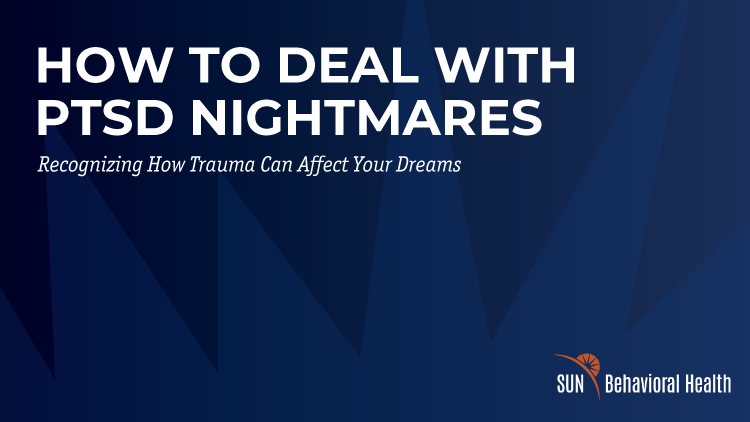Services
- Home
- Mental Health
- Who We Treat
- How We Treat
- Patients & Visitors
- About
- Lexington
close

You jolt awake, ready to keep sprinting, ready to fight until you can’t move. That’s when the sweat on your forehead chills you, like shards of ice melting. Your room comes into focus, the bed you start to remember lying down in, the door you shut before you turned the light out.
Another nightmare.
Now you can start to calm down, to breathe and let the safety of your bedroom wrap around you like the twisted sheets and blankets on your bed, if only for a little while. But it’s still upsetting, the dream is still there, cooling off in your mind like the embers of a fire.
No matter how good your day was you just can’t seem to shake these nightmares from your post-traumatic stress disorder (PTSD).
You’re not alone and there are things you can do about them.
Post-traumatic stress disorder is something that can affect anyone who experiences trauma. This doesn’t mean the trauma has to happen to you either, it can be a situation where you witness something traumatic.
Car crashes, natural disasters, and the events of September 11th (even for people not in New York) are the types of situations that can result in PTSD.
Also, remember this: experiencing PTSD does not mean you’re weak, or failed, or are damaged in some way.
There’s not really a common length of time for recovering from PTSD because everyone’s bodies, minds, and experiences are so different. Some people could use therapy to help them get over it in a year and others could struggle for longer.
 If you are dealing with nightmares resulting from PTSD you are most definitely not alone. The U.S. Department of Veterans Affairs has done a lot of research on PTSD. Their data shows that, of people who aren’t dealing with PTSD, only 5% report persistent nightmares.
If you are dealing with nightmares resulting from PTSD you are most definitely not alone. The U.S. Department of Veterans Affairs has done a lot of research on PTSD. Their data shows that, of people who aren’t dealing with PTSD, only 5% report persistent nightmares.
Compared to the people struggling with PTSD, where anywhere from 70% to 96% are dealing with nightmares, it is obvious the problem is widespread and common.
“Every time I close my eyes, I would have a nightmare,” said Valerie Ovalle of the U.S. Army. It can have massive impacts on our overall health when one of our ultimate forms of comfort and rest is taken from us.
Similarly, P.K. Philips wrote “I saw violent images every time I closed my eyes,” after experiencing many different traumas. For her the nightmares were only one part of her struggle; other symptoms followed along.
One thing you might experience, or see and read about from others who suffer from PTSD nightmares, is how they stick with you. If you wake up right in the middle of a nightmare the chances are high your brain won’t let go of those details quickly.
This can disrupt your entire night of sleep and then affect the next day even. It’s a horrible cycle that might seem like it’s never ending.
But there is help!
You can do a lot to start changing how your brain and body prepare for sleep, but also how they react to nightmares.
Doctors and scientists are still not 100% sure why we dream. In the case of PTSD nightmares though, they actually can trace the dream’s influence to the trauma involved. This means there’s a way forward, a way to get some relief.
The Scottish charitable organization PTSD UK investigated a lot of ways someone can start to treat their PTSD nightmares right from home.
First, they recommend avoiding temperatures that are too hot or too cold. You want your sleeping area to be right in that Goldilocks zone: juuuuust right. Second, if you are experiencing painful joints or general pain from your PTSD, then it might be a great idea to check with a doctor what to do.
They also recommend keeping a regular relaxation routine before bed. You should seriously consider not using your phone after a specific time in the night—to get your eyes/bed ready for sleep—as well as ensuring you are sleeping in total darkness.
A lot of things can throw off your sleep pattern and also lead to stress before bed. You want to hit that mattress as calm and relaxed as possible, so think about meditation which can be anything from sitting silently and breathing purposefully, to closing your eyes and going through guided meditation.
You’ve got the room just the right temperature, you’ve relaxed by meditating, and there’s no light streaming in from the lamppost outside your window. So, why are you still having PTSD nightmares?
First, always remember: everyone heals at different paces. Second, it might be time to try some therapeutic forms of treatment.
One that gets recommended a lot for PTSD nightmares is called Image Rehearsal Therapy (IRT). This is where you go over your nightmare and make up a new, positive and non-scary version. Once you have that in mind you write it out.
You’ll do this every day, writing out a non-threatening, happy version of the nightmare where maybe instead of you being chased by something horrible you are being chased by a puppy or something else that makes you happy. This process helps you to replace the nightmare with imagery, thoughts, and associations you prefer.
IRT has been used quite a bit to help with PTSD nightmares. There is a lot of research about how it works and why it’s so highly recommended. In fact, IRT has been so thoroughly researched it’s usually considered the preferred treatment for PTSD nightmares.
You can work through IRT in a solo therapy session or with a group and most treatments finish up in under 12 weeks. If that seems long, don’t worry, there’s also been research that has shown significant improvements in sleep and fewer nightmares after one IRT session. That doesn’t mean you should stop the treatment though!
Trust us, it’s possible. The human brain is strong and we know your trauma doesn’t define you. It might take a little bit, but once you begin focusing on healing the process has started.
Give us a call or shoot us an email if you have any questions. We know how trauma can overpower you sometimes and that is something you don’t have to be ashamed of. Give us a call at 859-429-5188 and let’s talk.
Are Bad Dreams a Sign of PTSD?
They may be. Not all bad dreams are related to PTSD, and the difference between a “bad” dream versus a “nightmare” might be hard to pin down, but the person experiencing them will usually know which is which. Nightmares tend to be much, much more disruptive to sleep, and can kind of hang around your mind throughout the following day. If you are having bad dreams constantly or at least commonly enough you start to get less sleep, it may be from PTSD. Another way to check is to try and think about any traumatic experience you have had recently, and then it might be easier to draw a line between when the bad dreams started and why they may be happening.
What Helps With PTSD Nightmares?
You can make sure your bedroom is not too cold or too hot; start a nightly relaxation routine to prepare for sleep; ensure there isn’t light in your room keeping you from sleeping deeply; exercise daily; talk about your dreams; and engage in Image Rehearsal Therapy (IRT). Everyone’s brain and body is different so the exact combination of treatments for you will most likely not be the same as someone else dealing with PTSD nightmares.
How Do You Sleep With PTSD Nightmares?
You may have to ask your doctor for help and you may have to begin therapy in order to work through the trauma that is causing the nightmares. The methods listed above can offer some help, but Image Rehearsal Therapy (IRT) specifically is a therapy you can get great benefits from when you work with a therapist. It might seem hard—or even on some nights impossible— to fall asleep, but staying calm and trying to focus on relaxation, as well as rerouting your thoughts to positivity are all ways you can begin the process of getting to sleep. It may take a dedicated therapeutic treatment to get you past the nightmares in the long run. The good news is, there are well-researched methods for helping, like (IRT).